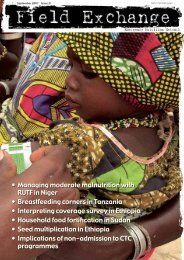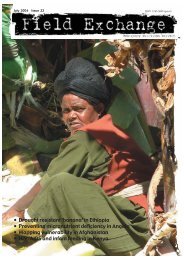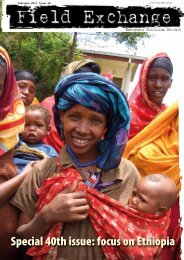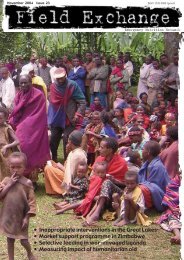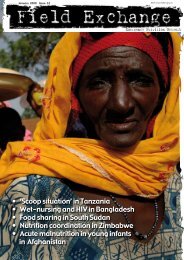Download PDF - Field Exchange - Emergency Nutrition Network
Download PDF - Field Exchange - Emergency Nutrition Network
Download PDF - Field Exchange - Emergency Nutrition Network
- No tags were found...
Create successful ePaper yourself
Turn your PDF publications into a flip-book with our unique Google optimized e-Paper software.
News & Views<br />
webimage, Cuba, 2003<br />
Humanitarian<br />
Aspects of The<br />
Indian Ocean<br />
Catastrophe<br />
Cover of Cuba childrens book<br />
Cuba<br />
According to a news piece in the<br />
LANCET, 1 the ’41- year battle of<br />
spite between Cuba and the USA<br />
has intensified’. In July 2004, restrictions<br />
on travel and remittances from the USA<br />
were tightened, and US firms were fined<br />
for unauthorised export of medicines.<br />
The US embargo on Cuba has frequently<br />
been modified in response to<br />
domestic electoral interests. So in the US<br />
election year, it is hardly surprising that<br />
once again political expediency rather<br />
than humanitarian imperatives are driving<br />
US policies. Worryingly, there has<br />
also been a scaling up of talk in the USA<br />
about regime change – by transition<br />
rather than succession – in Cuba. In<br />
January 2004, the University of Miami<br />
and the US Agency for International<br />
Development convened a seminar on<br />
‘Humanitarian Aid for a Cuba<br />
Transition’. Here US government representatives<br />
suggested the use of health<br />
and nutrition assistance as a means to<br />
effect regime change. Attendees were<br />
exhorted to learn from the Coalition<br />
Provisional Authority actions in Iraq to<br />
prepare for a post-Castro Cuba – specific<br />
lessons were not detailed.<br />
Sri Lanken town of Hikkaduwa,<br />
after a tsunami hit on 26<br />
December 2004.<br />
The Humanitarian Policy Group has produced a briefing note covering<br />
some of the humanitarian aspects of the Indian Ocean catastrophe. It provides<br />
a series of links to relevant papers, websites and other sources,<br />
including research conducted by ODI. This can be found at<br />
http://www.odi.org.uk/hpg/index.html. These are preliminary reflections<br />
only and there are plans to produce a revised version when the facts and issues<br />
become clearer. Also on the HPG site is a short note by Paul Harvey on the<br />
potential use of cash and vouchers in situations of this kind.<br />
On the Humanitarian Practice <strong>Network</strong> (HPN) site, you will find a short<br />
commissioned piece The Asian tsunami: The implications for preparedness and<br />
contingency planning by John Twigg and Richard Choularton,<br />
http://www.odihpn.org/report.aspID=2690.<br />
Inter-Agency Meeting on<br />
Community Therapeutic Care<br />
Reuters/Beawharta, courtesy, www.alertnet.org<br />
Some attendees denounced the use of<br />
humanitarian assistance to divide and<br />
destabilise a post-Castro Cuba, pointing<br />
out that it would jeopardise the chance<br />
for peaceful change and rob Cubans of<br />
sovereignty in deciding their future.<br />
Although, long a shining jewel in Cuba’s<br />
crown, the country’s impressive health<br />
cannot go on forever. Political instability<br />
would only place further stress on a system<br />
that is already struggling. Cuba’s<br />
remarkable health record, even during<br />
the economic crisis of the 1990s, has<br />
always frustrated the US administration.<br />
The article concludes by saying that<br />
‘In the event of a humanitarian crisis,<br />
funds from family overseas and high<br />
education and health standards would<br />
help protect Cubans from large rises in<br />
mortality rates. Those who suffer the<br />
most will, as in the 1990s, be the elderly<br />
who could become the quiet deaths in a<br />
society heavily focused on protecting the<br />
young’.<br />
FANTA, SC US and Concern hosted an<br />
inter-agency meeting on Community<br />
Therapeutic Care between February<br />
28th and March 2nd, 2005 in Washington.<br />
The main aims of the meeting were to;<br />
i) Identify issues and challenges in imple<br />
mentation, integration and scaling up.<br />
ii) Discuss mechanisms to ensure quality<br />
control of CTC implementation.<br />
iii) Documentation (in a synthesis report) of<br />
issues and challenges in CTC implementation<br />
iv) Establish a mechanism for improved,<br />
cross organizational capacity building<br />
and training.<br />
Key findings of the meeting will be highlighted<br />
in <strong>Field</strong> <strong>Exchange</strong> 26 and a full report<br />
of the meeting will be prepared by the ENN<br />
and made available in the coming months.<br />
CTC meeting in progress, Wahington DC.<br />
Garfield.R (2004): Health care in Cuba<br />
and the manipulation of humanitarian imperatives.<br />
The LANCET, vol 364, September 11th,<br />
pp 1007<br />
R.Gill, USA, 2005<br />
14



